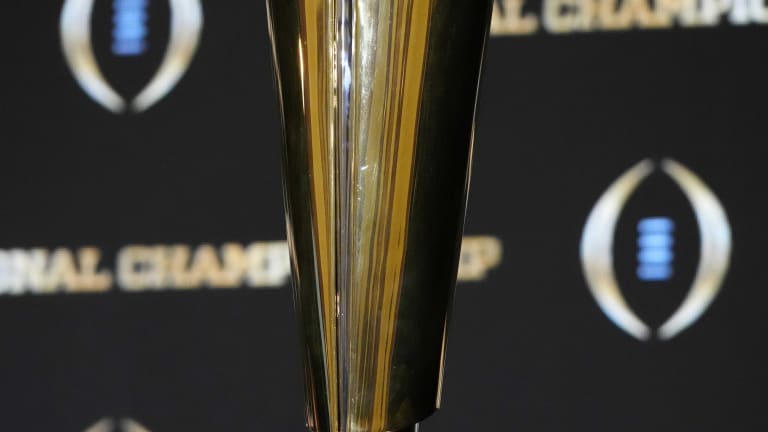
IS the CFP ready to squeeze the independence out of ND?
By Mark Blaudschun
GRAPEVINE, Tx.--Dan Mullin had been working for nearly an hour in the annual College Football Playoff Mock Selection Exercise on Monday, an annual event conducted by the CFP to better inform the media about the CFP selection process.
Mullin, a current football analyst for ESPN, with an SEC pedigree after coaching stints at Mississippi State and Florida and a stubborn New Hampshire pedigree, was talking about the status of Notre Dame, the last bastion of independent football at the Power 5 conference level.
The fact that the 2021 season was under scrutiny didn''t sidetrack Mullin.
He wanted to know from CFP executive director Bill Hancock and CFP selection chairman Boo Corrigan, who is the athletic director at North Carolina State and a ND graduate, why the CFP granted the Irish status nearly equal status to the 5 Power 5 conference champions.
Mullin was referring to the 2021 season in which the once beaten Irish were placed in the No. 6 slot, pointing out that the only quality opponent ND had faced that season was Cincinnati, a member of the Group of 5 American Athletic Conference.
And that the unbeaten Bearcats had posted a solid 24-13 win over ND in South Bend, a victory which was the main reason why Cincinnati became the first Group of 5 team to make the Final Four.
He noted the significant changes in college realignment over the past few years, with even bigger changes starting next season.
He talked about the power the CFP and the conferences now had and why they would let Notre Dame dictate any power moves since it was not exposed to the rigors of a conference race or championship game.
Then he paused and asked Hancock, a founding father of the CFP and Corrigan, one of the sharper committee chairman in CFP's 10-year history a direct question.
"Why don't the conferences and the CFP simply tell Notre Dame either you join a conference or you don't play in our tournament?''
Hancock and Corrigan, sitting next to each other, and experts in deflecting controversial questions, looked at each other with wry smiles.""It's been discussed,'' said Corrigan. ""That's a red wine table discussion..'
"It's been discussed,'' said Corrigan. "That's a red wine table discussion.''
Then he showed his ND heritage. "They can join the ACC,'' he said with a laugh.
Which is obviously far from the formality of conference commissioners and presidents making it an item on the agenda.
Notre Dame has flirted with conferences such as the Big Ten and ACC for decades. The Irish are full member of the ACC in all other sports (other than hockey).
Football is different matter.
The Irish have their own television network (NBC)and agenda. They have made a deal with the ACC to play five ACC teams a year in football.
In exchange, the Irish receive a spot in the ACC bowl rotation, other than the spot guaranteed for the champion in the Orange Bowl, a move which irritated many member of the ACC.
A few years ago, the ACC even allowed Notre Dame to play a full ACC schedule on a trial basis. ND finished first in the regular season, but lost to Clemson in the ACC title game and received a full ACC television revenue share --more than double what ND earned from NBC.
The Irish took the money and ran back to their independent status in football a year later.
There is no doubt the ACC, which is now at 17 teams with the addition of SMU, Stanford and Cal, has an open invitation for ND to become CFB member No. 18.
The ACC could play hardball with the Irish, by telling them their membership in the conference will only be as a member in all sports, a threat ND would take seriously.
But the Irish also know that if they were looking for a conference in all sports, he Big Ten, bulging with 18 members with its West Coast add-ons, would gobble them up.
While there may have been discussions, there is little chance anything will happen for the next two seasons. Too many contracts and other business issues must be changed.
But the start of a new television contract in 2026 looms.
These are turbulent times and ANY changes cannot be ruled out.
Notre Dame has new athletic administration personnel with the retirement of athletic director Jack Swarbrick--another key figure in the CFP power structure.
There is a new breed of commissioners with different agendas.
Notre Dame has not responded to the power moves of one conference, but a group effort with 10 conferences and the CFP establishing new guidelines reequiring conference affiliation is not an outrageous idea and may be a matter not of if. but when.